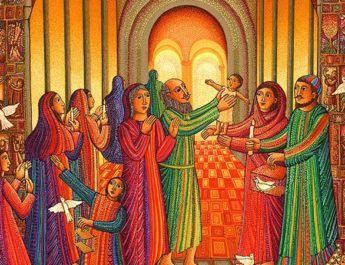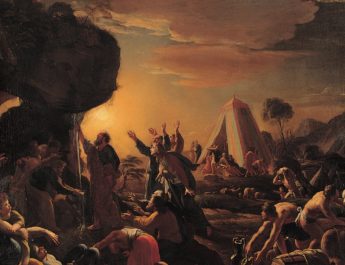Romans 3:28-30 & 5:1-11
Narrative Lectionary 144
3:28 For we holdA that a personB is justifiedC by faithD
A “hold” = logizomai. From logos (word, statement, speech, analogy; here, word as an account or accounting; can also be a word that carries an idea or expresses a thought, a saying; a person with a message or reasoning laid out in words; by implication, a topic, line of reasoning, or a motive; can be used for a divine utterance or as Word – Christ); from lego (to speak, tell, mention). This is this is to compute or reckon up, to count; figuratively, it is coming to a conclusion or decision using logic; taking an inventory in a literal or figurative sense.
B “person” = anthropos. Probably from aner (man, male, husband) + ops (eye, face); {from optanomai (to appear, be seen); perhaps from horao (become, seem, appear)}. This is human, humankind. Used for all genders.
C “justified” = dikaioo. From dikaios (correct, righteous – implies innocent; this is that which conforms to God’s notion of justice, uprightness); From dike (the principle of justice; that which is right in a way that is very clear; a decision or the execution of that decision; originally, this word was for custom or usage; evolved to include the process of law, judicial hearing, execution of sentence, penalty, and even vengeance; more commonly, it refers to what is right); may be from deiknumi (to show, point out, exhibit; figurative for teach, demonstrate, make known). This is to be righteous, plead the cause of, justify, acquit. Properly, it is being approved, particularly carrying the weight of a legal judgment. It is upright, render just, or innocent.
D “faith” = pistis. From peitho (to have confidence, urge, be persuaded, agree, assure, believe, have confidence, trust). This is less about knowing, believing, and repeating a list of doctrines then it is about trusting God. Faith means listening to God and seeking to live a holy life even (and especially) when we don’t understand how everything works or fits together. Faith is about being faithful (trusting and doing) rather than being all knowing.
apart fromE worksF prescribed by the law.G
E “apart from” = choris. From chora (space, land, region, fields, open area); from chasma (gap, gulf, chasm, open space); from chasko (to gape, yawn). This is apart from, separate from.
F “works” = ergon. From ergo (to work, accomplish, do). This is work, task, deed, labor, effort.
G “law” = nomos. From nemo (to parcel out). Literally, this is that which is assigned. It can be usage, custom, or law. This word can be used for human or divine law. It can be used specifically for the law of Moses or as a name for the Torah (the first five books of the Bible). Sometimes it is used for scripture as a whole, used of the Gospel, or of any theology. It is also used for the “tradition of the elders,” which would be the oral Torah – the tradition of the laws plus their interpretations as they were passed down over time. We must carefully consider which meaning of “law” is meant when we interpret passages the word is found in.
29 Or is GodH the God of JewsI only?J Is he not the God of gentilesK also? Yes,L of gentiles also,
H “God” = Theos. From Proto-Indo-European origins, meaning do, put, place. This is God or a god in general.
I “Jews” = Ioudaios. From Ioudas (Judah, Judas); from Hebrew Yehudah (Judah, son of Jacob, his tribal descendants, a name for the southern kingdom. Literally, it means praised); probably from yadah (to throw one’s hands into the air in a gesture of praise); from yad (hand). This is Jewish, a Jew, or Judea.
J “only” = monon. From monos (alone, single, remaining, mere, desolate); from meno (to stay, abide, wait, endure). This is merely, only, simply, sole. It can also imply alone.
K “gentiles” = ethnos. Probably from etho (a custom or culture). This is people who are united by having similar customs or culture. Generally, it is used to refer to Gentiles. This is a tribe, race, nation, or Gentiles in general. This is where the term “ethnicity” comes from.
L “yes” = nai. This is yes, truly, indeed. It is a strong affirmation.
30 since God is one,M and he will justify the circumcisedN on the ground of faith and the uncircumcisedO through that same faith.
M “one” = heis. This is one, a person, only, some.
N “circumcised” = peritome. From peritemno (to circumcise; literally cut around); {from peri (about, concerning, all around, encompassing) + same as tomos or tomoteros (sharp or keener); from temno (to cut as with a single slice)}. This is properly, cut around, referring to the way that foreskin is removed and so this is to circumcise. It can be used or the rite or the people who are circumcised – in a literal or figurative sense.
O “uncircumcised” = akrobustia. Perhaps from akron (end, tip, top, extreme); {related to akantha (thorn bush, thorn); from ake (point, edge)} + posthe (penis). This is foreskin – so, someone who is not circumcised or a Gentile.
5:1 Therefore, since we are justified by faith, we haveP peaceQ with God through our LordR JesusS Christ,T
P “have” = echo. This is to have, hold, possess.
Q “peace” = eirene. Perhaps from eiro (to join, tie together to form a whole). This is one, peace, quietness, rest, peace of mind, harmony. Peace was a common farewell among Jews (i.e. shalom) and this well-wishing included a blessing of health and wholeness for the individual. This word also indicates wholeness and well-being – when everything that is essential is joined together properly. This is peace literally or figuratively. By implication, it is prosperity (but not in the sense of excessive wealth. Prosperity would have meant having enough from day to day.)
R “Lord” = Kurios. From kuros (authority, supremacy). This is a respectful address meaning master or sir. It refers to one who has control or power greater than one’s own. So, it was also applied to God and Jesus as Master or Lord.
S “Jesus” = Iesous. From Hebrew Yehoshua (Joshua, the Lord is salvation); {from YHVH (proper name of the God of Israel; the self-existent and eternal one); {from havah (to become) or from hayah (to come to pass, become, be)} + yasha (to deliver, defend, help, preserve, rescue; properly, to be open, wide or free, which implies being safe. So, in a causative sense, this is to free someone)}. This is Jesus or Joshua in Greek – the Lord saves or the Lord is salvation.
T “Christ” = Christos. From chrio (consecrate by anointing with oil; often done for prophets, priests, or kings). Literally, the anointed one, Christ. The Greek word for Messiah.
2 through whom we have obtainedU, V accessW to this graceX
U “obtained” = echo. Same as “have” in v5:1. See note P above.
V {untranslated} = pistis. Same as “faith” in v3:28. See note D above.
W “access” = prosagoge. 3x in NT. From prosago (to come to, approach); {from pros (at, toward, with) + ago (lead, carry, guide, go)}. This is approach, access, introduction. Generally, it refers to face to face interaction.
X “grace” = charis. From chairo (to rejoice, be glad; used to say hello; properly, delighting in the grace of God or experiencing God’s favor); from char– (to extend favor, lean towards, be inclined to be favorable towards). This is grace, kindness, favor, gratitude, thanks. It is the sense of being inclined to or favorable towards – leaning towards someone to share some good or benefit. This can be literal, figurative, or spiritual. It is grace as abstract concept, manner, or action.
in which we stand,Y and we boastZ in our hopeAA of sharing the gloryBB of God.
Y “stand” = histemi. This is to stand, place, establish, appoint, stand ready, be steadfast.
Z “boast” = kauchaomai. Perhaps from auxen (neck). This is literally holding one’s head high – to boast proudly or to glory, joy, exult, rejoice. It can be boasting in a positive or negative sense.
AA “hope” = elpis. From elpo (to anticipate, welcome, expect; usually to anticipate positively). This is expectation, hope, trust, confidence faith. The expectation can be abstract or concrete.
BB “glory” = doxa. From dokeo (to have an opinion, seem, appear, suppose; a personal judgment; to think); from dokos (opinion). This is literally something that evokes a good opinion – something that connects to our understanding of intrinsic worth. The ultimate expression of this is, of course, God and God’s manifestation. So, this is opinion, honor, and dignity, but also praise, glory, renown, and worship.
3 And not only that, but we also boast in our afflictions,CC knowingDD that affliction producesEE endurance,FF
CC “afflictions” = thlipsis. From thlibo (to press in on and make narrow, rub together, constrict; figuratively to oppress or afflict). This is pressure that hems us in – used often of internal pressure that makes us feel like we have no other options and are confined or restricted. So, this is persecution, affliction, trouble, distress, and anguish. There is a different word, stenoxoria, that refers to external pressure that we feel from what’s going on.
DD “knowing” = eido. This is to know, consider perceive, appreciate, behold, or remember. It means seeing with one’s eyes, but also figuratively, it means perceiving – seeing that becomes understanding. So, by implication, this means knowing or being aware.
EE “produces” = katergazomai. Related to “works” in v3:28. From kata (down, against, throughout, among, daily) + ergazomai (to work, labor); {from ergon (see note F above)}. This is working something until it is completed, working fully, accomplishing, producing, achieving, performing.
FF “endurance” = hupomone. Related to “only” in v3:29. From hupo (by, under, about) + meno (see note J above). This is properly to remain behind or remain under. It implies endurance, patience, steadfastness, and waiting in hope.
4 and endurance produces character,GG and character produces hope, 5 and hope does not put us to shame,HH because God’s loveII has been pouredJJ
GG “character” = dokime. Related to “glory” in v5:2. 8x in NT. From dokimos (what passes the test, approved, acceptable, genuine, verified); from dokeo (see note BB above). This is trial, proof, ordeal, approval, character, trustworthiness.
HH “put…to shame” = kataischuno. 13x in NT. From kata (down, against, according to, among) + aischunomai (to dishonor, put to shame, shrink, disfigure); {from aischos (shame, disgrace, disfigurement)}. This is literally to shame down, which is to say disgrace or implying make someone blush. It can be frustrate, dishonor, confound or shame.
II “love” = agape. From agapao (to love, take pleasure in, esteem; to prefer). This is love, goodwill, benevolence. It is God’s divine love or human love that mirrors God’s love.
JJ “poured” = ekcheo. From ek (from, from out of) + cheo (to pour). This is something poured out in a liberal fashion. So, it is gushing, spilling, or shedding.
into our heartsKK through the HolyLL SpiritMM that has been givenNN to us.
KK “hearts” = kardia. Literally the heart, but figuratively mind, character, inner self, will, intention, thoughts, feelings. Also, the center of something. The word heart is only used figuratively in the Old and New Testaments. This is where “cardiac” comes from.
LL “Holy” = Hagios. From hagnos (holy, sacred, pure ethically, ritually, or ceremonially; prepared for worship, chaste, unadulterated, pure to the core; undefiled by sin; figurative for innocent, modest, perfect). God is totally different from humanity and thus set apart. That which is consecrated to worship God (elements of worship) or to serve God (as the saints) are holy because they are now set apart for God’s purposes. Holy because important to God. This is sacred physically, pure. It can be morally blameless or ceremonially consecrated.
MM “Spirit” = Pneuma. From pneo (to blow, breathe, breathe hard). This is wind, breath, or ghost. A breeze or a blast or air, a breath. Figuratively used for a spirit, the human soul or part of us that is rational. It is also used supernaturally for angels, demons, God, and the Holy Spirit. This is where pneumonia comes from.
NN “given” = didomi. To give, offer, place, bestow, deliver. This is give in a literal or figurative sense.
6 For while we were still weak,OO at the right timePP Christ diedQQ for the ungodly.RR
OO “weak” = asthenes. From a (not) + sthenes (strong, vigor); {from the base of sthenoo (to strengthen so that one can be mobile); from sthenos (strength)}. This is without strength so weak, sick, helpless, frail, feeble. It can also be unimpressive or impotent. It can be used for physical or moral weakness.
PP “right time” = Kairos. This is season, opportunity, occasion. The word chronos is used for chronological time. Kairos is used for spiritually significant time – the right time or appointed time.
QQ “died” = apothnesko. From apo (from, away from) + thnesko (to die, be dead). This is to die off. It is death with an emphasis on the way that death separates. It can also mean to wither or decay.
RR “ungodly” = asebes. 9x in NT. From a (not) + sebo (to worship, revere, adore, be devout; properly this is personally placing a high value on someone or something, showing respect). Properly, this is being irreverent, not acting with appropriate respect or declining to show honor to the sacred. So, it could be ungodly, impious, wicked, or irreverent.
7 Indeed, rarelySS will anyone die for a righteousTT person—though perhapsUU for a goodVV person someone might actually dareWW to die.
SS “rarely” = molis. 6x in NT. From mogos (laborious toil) OR from molos (toil) OR from mogis (scarcely, barely; something that only happens with difficulty; emphasizes that the action is prolonged and therefore difficult). This is something that hardly happens and/or requires a lot of effort.
TT “righteous” = dikaios. Related to “justified” in v3:28. See note C above.
UU “perhaps” = tacha. 2x in NT. From tachus (quickly, promptly; without unreasonable delay). This is perhaps, presently, without excessive delay.
VV “good” = agathos. This is good, a benefit, or a good thing. It is good by its very nature, intrinsically good. A different word, kalos, refers to external signs of goodness.
WW “dare” = tolmao. 16x in NT. From tolma (boldness); perhaps from telos (an end, aim, purpose, completion, end goal, consummation, tax); from tello (to start out with a definite goal in mind). This is to show courage to take a risk, to venture decisively, to put it on the line for something that matters.
8 But God provesXX his love for us in that while we still were sinnersYY Christ died for us. 9 MuchZZ moreAAA surely, therefore,
XX “proves” = sunistemi. Related to “stand” in v5:2. 16x in NT. From sun (with, together with) + histemi (see note Y above). This is to establish, exhibit, demonstrate, stand together, prove.
YY “sinners” = hamartolos. From hamartano (to miss the mark, do wrong, make a mistake, sin); {from a (not) + meros (a part or share)}. This is sinning, sinful, sinner. It referred to missing the mark or falling short. The term was also used in archery for missing the target.
ZZ “much” = polus. This is much, often, plenteous – a large number or a great extent.
AAA “more” = mallon. This is rather, more than, or better.
since we have now been justified by his blood,BBB will we be savedCCC through him from the wrathDDD of God.
BBB “blood” = haima. This is blood in a literal sense as bloodshed. Figuratively, it can also be used to refer to wine or to kinship (being related).
CCC “saved” = sozo. From sos (safe, rescued, well). This is to save, heal, preserve, or rescue. Properly, this is taking someone from danger to safety. It can be delivering or protecting literally or figuratively. This is the root that “savior” and “salvation” come from in Greek.
DDD “wrath” = orge. From orgao (something that teems or stews; anger rising from prolonged personal contact that is fixed rather than an angry outburst; anger that stems from an individual’s sense of right and wrong, justice, etc.) or from orego (to stretch out towards, yearn for, aspire to, desire). This is impulse, wrath, anger, passion, punishment. Properly, this is fixed anger from ongoing personal irritation caused by something the one getting angry sees as unjust or evil. Wrath implies punishment. Can refer to human or divine wrath.
10 For if while we were enemiesEEE we were reconciledFFF to God through the deathGGG of his Son,HHH much more surely, having been reconciled, will we be saved by his life.III
EEE “enemies” = echthros. From echthos (hatred). This is an openly hostile person so an enemy, a foe, or a hated person. This speaks of irreconcilable hostility. It can also mean adversary and/or refer to Satan.
FFF “reconciled” = katallasso. 6x in NT. From kata (down, against, among) + allasso (to change, transform) {from allos (other, another; another of a similar kind or type)}. This is to reconcile, change, or exchange. It is a moment when two parties come together in reconciliation and both parties change as a part of it.
GGG “death” = thanatos. Related to “died” in v5:6. From thnesko (see note QQ above). This is death, whether literal or spiritual. It can also refer to something that is fatal.
HHH “Son” = huios. This is son, descendant – a son whether natural born or adopted. It can be used figuratively for other forms of kinship.
III “life” = zoe. From zao (to live, be alive). This is life including the vitality of humans, plants, and animals – it is life physical and spiritual and life everlasting.
11 JJJBut more than that, we even boast in God through our Lord Jesus Christ, through whom we have now receivedKKK reconciliation.LLL
JJJ {untranslated} = monon. Same as “only” in v3:29. See note J above.
KKK “received” = lambano. It does not refer to passive receiving of something, but active acceptance or taking of something whether it is offered or simply nearby. It focuses on individual decision and action.
LLL “reconciliation” = katallage. Related to “reconciled” in v5:10. 4x in NT. From katallasso (see note FFF above). This is reconciliation or atonement.
Image credit: “Hupostasis” created by Gladys Torres, 2011.




